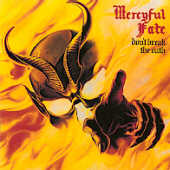Mercyful Fate - Official Website
Don't Break The Oath |
Denmark
 |
|---|

Review by Felix on July 6, 2022.
I always try to be careful with the use of superlatives, but here I am pretty sure: “Don’t Break the Oath” has the best artwork of all times. The artist, Thomas Holm, did an excellent job. The flame-covered devil points at us, the then rapidly growing metallic community, and the evil of the genre cannot be expressed in a better way. Phenomenal picture!
The evil of the genre… but what genre are we talking about? The EP and “Melissa” had already revealed the innovative force of the Danes. I see that M-A categorises Mercyful Fate simply as heavy metal. That’s neither wrong nor right, because on the one hand, the five-piece evaded any poser/thrasher scheme, on the other hand, their early albums were so much more than “only” heavy metal. The occult touch of all nine compositions characterizes their second album and separates it from almost each and every other output from 1984. Priest’s “Defenders of the Faith” was also released in George Orwell’s year and it is a sensational metal output (“Freewheel Burning”!), their best and more or less the epitome of pure heavy metal – but it spreads completely different vibes than “Don’t Break the Oath”. Main composer Hank Sherman and his comrades had a totally individual understanding of metal-compatible melodies. To paint it black and white: Judas Priest (and some other pioneers) delivered power, power and even more power – great! Mercyful Fate were the gateway to a further dimension, the band that unlocked the floodgate for those who wanted more than pure power. The King and his henchmen presented horror, discomfort, power (of course), melancholy, maliciousness, nightly atmosphere and a perfect symbiosis between their sound and the visual aesthetics (unfortunately, Priest’s painted tank on “Defenders…” appears rather infantile.) Again: great!
How did Mercyful Fate create all these moods and feelings? Naturally, the falsetto of the King must be mentioned. But it goes without saying that his performance does not explain the inner strength of the instrumental parts. The guys from Copenhagen combine atmospheric sounds with straight rocking lines, they dish up tons of bulky, pretty progressive riffs and a few softer sequences are connected with earthy, metallic guitars. Just listen to the title track – it will confirm every statement of the previous sentence. Nevertheless, the band was not stuck in just one song-writing formula – nowhere near! The direct neighbour of “The Oath”, namely “Gypsy”, shows that the quintet was also familiar with the stunning vitality of simple, direct songs. Especially this track profits from the unique, glass-shattering vocal lines of the King and his lyrical brilliance. He creates awe-inspiring pictures before the inner eye when he sings about “a light in a magic winter night” or “gypsy wagons left in the snow”. Better still, he leaves his mark in every song – just experience the fantastic “Even in the night I see a light shining bright” line in “Welcome Princess of Hell”, a song where raw and bulky riffs melt with each other seamlessly.
Production-wise, “Don’t Break the Oath” is – in contrast to all the shady creatures that are mentioned in the lyrics – free from sin. The album sounds clear and dark, transparent and sinister at the same time. It’s a taut mix without any serious flaws. The guitar tones breathe evil right from the beginning and it’s awesome to realize how the circling riffing at the beginning of the opener draws the listener into the music in a matter of seconds. Indeed, this is definitely the start of “A Dangerous Meeting” and even the church bells at the end of the song do not bring redemption. However, I enjoy a very robust song that confirms the way of proceeding on “Melissa” right from the get-go. Mercyful Fate were still the heralds of occult scenarios, but the exciting lyrical mission was never at the expense of the fundamental metal structure.
Finally, “Don’t Break the Oath” is not completely free from improvable moments. (Please forgive me this blasphemous note.) The short and soft intermezzo “To One Far Away” seems to be part of the band’s individual concept, but there is another track which does not fully convince. Sorry guys, I will not write its title here. This would be unfair against “Night of the Unborn”. It lacks expressiveness as well as coherence and cannot reach the level of songs like the multi-faceted “Nightmare” which offers everything between ghoulish metal and modern chamber music. But even the most stupid white magician must understand that these small grey spots do not hurt the overall impression in a significant manner. Thus, the enormous importance of the album is justified – by the way, this separates the diabolic monument from the slack “Master of Puppets”. Another marginal note: Jülle reveals in the movie “Total Thrash” that the first line of the title track “By the symbol of the creator” inspired him to rename his and Mille's combo. How many more arguments do you need? Either you have a problem with the singing capades of the King or you will appreciate this eerie work a lot. Without making any compromises, it marks a milestone for those who are screaming Priest or Maiden as well as for those who yell Celtic Frost or Bathory.
Rating: 9 out of 10
672